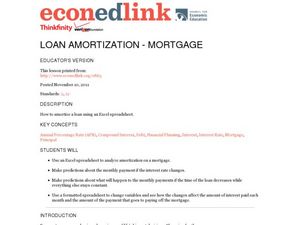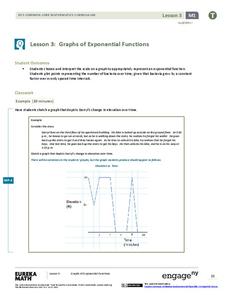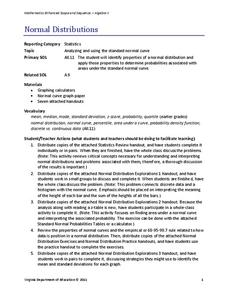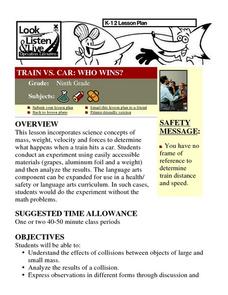Curated OER
Point- vs. Non-point Pollution
Students differentiate between point and non-point pollution and determine how the different types of pollution are harmful to aquatic ecosystems. They complete a series of tests on a sample of "polluted" water and a sample of "pure" water.
Federal Reserve Bank
A Penny Saved
Budgeting, net vs. gross pay, savings, and fees are all key elements of personal financing and essential for your class members to learn about as young adults.
North Carolina State University
Exploring Genetics Across the Middle School Science and Math Curricula
Where is a geneticist's favorite place to swim? A gene pool. Young geneticists complete hands-on activities, experiments, and real-world problem solving throughout the unit. With extra focus on dominant and recessive genes, Punnett...
Curated OER
Monsters are Make-Believe
Students decide if items are real or make-believe. In this lesson on reality, students listen to the book Where the Wild Things Are by Maurice Sendak and discuss the difference between items that are real and items that are make-believe.
Curated OER
Making Money and Spreading the Flu!
Paper folding, flu spreading in a school, bacteria growth, and continuously compounded interest all provide excellent models to study exponential functions. This is a comprehensive resource that looks at many different aspects of...
Curated OER
Velocity of Traffic on Highway 26
Physics fanatics time five cars as they pass on the highway. They use the times and a 20-yard distance to calculate velocity. They also graph distance vs. time. A page of student pre-lab questions is provided in addition to the activity...
Curated OER
Loan Amortization - Mortgage
Upper graders explore the connection between interest and principal. They use an amortization schedule to determine the amount of principal paid vs interest on a $100,000 home loan. Fourteen discussion questions and a research-based...
EngageNY
Graphs of Exponential Functions
What does an exponential pattern look like in real life? After viewing a video of the population growth of bacteria, learners use the real-life scenario to collect data and graph the result. Their conclusion should be a new type of...
Curated OER
Evidence of Evolution by Natural Selection: Testable Hypotheses #2
These slides will activate prior knowledge with real-life examples of natural selection. The predictions and outcomes for those examples are explained. Your students will like the information about the relevant chromosome tests that can...
Virginia Department of Education
Normal Distributions
Pupils work to find probabilities by using areas under the normal curve. Groups work to calculate z-scores and solve real-world problems using the empirical rule or tables.
Serendip
Understanding How Genes Are Inherited via Meiosis and Fertilization
Bring the excitement of genetics to scholars with a dynamic hands-on meiosis modeling experience. During the activity, biologists follow step-by-step procedures to build chromosomes, model independent assortment, learn about crossing...
Curated OER
Traditional Values vs. Modern Culture in the Asian Community
Students examine Chinese culture and values. They research the teachings of Confucius, create posters, write short stories, and analyze the history of and present state of gang culture through research, discussion, and writing.
Curated OER
Women in the WWII Workplace: Propaganda vs. Reality
In this propaganda worksheet, students analyze posters of Rosie the Riveter and respond to 4 short answer questions about the poster and World War II realities.
Curated OER
Cartoons for the Classroom: Free Speech vs. Respect for Religion
In this historical events worksheet, students analyze political cartoons about the First Amendment. Students respond to 3 talking point questions.
Curated OER
Train vs. Car: Who Wins?
Ninth graders conduct an experiment demonstrating what happens when a train hits a car using easily accessible materials. They calculate momentum, velocity, and distance using the appropriate formulas. Then they write an incident report...
Curated OER
Salmon Vs. Dams: the Dam Removal Debate on the Elwha River
Students role-play a meeting of the Elwha River council in which they present opposing views to council members on hydroelectric power and salmon fisheries resources. They brainstorm possible conflicts between various people in land-use...
Curated OER
Chapter 7: Measuring Domestic Output, National Income, and the Price Level
Young economists will enjoy this approachable and informative presentation. It is full of helpful graphs and definitions. Especially interesting will be the graph that measures the global perspective of the underground economy as a...
Curated OER
Rules of Thumb for Diction
What is the difference between accept and except? Affect and effect? Brilliantly advise your class with the advice in these slides. Definitions of commonly misused words from A-Z help clarify meaning and usage.
Curated OER
Slope & Rate of Change
This short handout addresses the concept of slope in two different ways: geometrically and analytically. Start with a brief description of slope, then use graphical representations to compare positive vs. negative slope and zero vs....
Curated OER
Language Practice #5: Grades 2-3
In this language practice learning exercise, students find opposites and correctly spelled words, determine real vs. make-believe and edit sentences.
Curated OER
Your Politician: Myth vs. Reality
Pupils adopt a public official, research how they spend their time, and define the actual duties associated with the job. They sort perceptions about the job into myths and realities, and analyze political cartoons involving their official.
Curated OER
Dogs vs. Cats: Pet Ownership Essay
Students analyze patterns of organization used in writing to determine how and when comparisons and contrasts can be effectively utilized to identify similarities and differences or pros and cons.
Curated OER
Who's vs. Whose
In this pronouns activity, students view eight pictures and then complete eight sentences by placing the appropriate pronoun, who's or whose, in each blank.
Curated OER
A Peek at the Past: Gradualism vs. Punctuated Equilibria
Learners consider two sets of simulated fossils (caminalcules) that are provided as cutouts. They arrange them on two time scales. One set produces a visual example of gradualism, the other shows punctuated equilibria.






